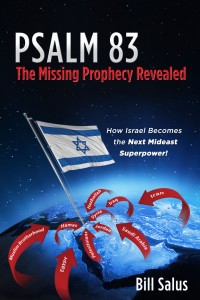Is Isaiah 19 Finding Fulfillment Amidst Egypt’s Chaos?
on Thursday, August 15, 2013 by Bill Salus A dear friend sent me an important email recently. Amidst the backdrop of the current chaos occurring in Egypt between the Egyptian military and the Muslim Brotherhood, he asked me if we could be witnessing the fulfillment of Isaiah 19, and if so, who might emerge as the cruel master of Isaiah 19:4.
A dear friend sent me an important email recently. Amidst the backdrop of the current chaos occurring in Egypt between the Egyptian military and the Muslim Brotherhood, he asked me if we could be witnessing the fulfillment of Isaiah 19, and if so, who might emerge as the cruel master of Isaiah 19:4.
The friend is the bestselling author and CBN TV host, Erick Stakelbeck. His latest blockbuster book called The Brotherhood: America’s Next Great Enemy has raced to the top-seller list on Amazon. Erick is rapidly becoming the Mideast expert in demand on FOX News and many other mainstream media sources.
I have had the blessed opportunity to have appeared on several of Erick’s Stakelbeck on Terror TV shows. (Watch them at the links below).
My response to Erick is below, and it is in direct correlation with my commentary on Isaiah 19, which is also included further down.
………
Erick – In all my research I can’t find any past fulfillment within Egypt’s history of Isaiah 19. The prophet penned this prophecy approximately 2700-years ago, and from then to now, no evidence exists that suggests anything other than this is still a pending prophecy.
Since it appears too still be pending, then the litmus test as to whether or not the current chaotic events in Egypt indicate that Isaiah 19 is occurring, are to ask a few simple poignant questions. If the answers to these questions are “Yes” on all accounts, then I would suggest that the prophecy is now in play.
1. Are things deteriorating swiftly in Egypt? (Isaiah 19:1)
2. Is there civil strife that is burgeoning into a revolution? (Isaiah 19:2)
3. Are there religious reasons behind the revolution? (Isaiah 19:3)
4. Are geopolitical conditions ripe for a dictator to rise to power? (Isaiah 19:4)
5. Is Egypt’s economy in dire straits? (Isaiah 19:5-10)
6. Is wisdom lacking as to why Egypt’s society is collapsing? (Isaiah 19:11)
7. Is Egypt’s future uncertain, and are the Islamic clerics dumfounded? (Isaiah 19:12)
8. Are Egyptians staggering about as if in a drunken stupor? (Isaiah 19:14)
9. Is the unemployment rate on the rise as a result of the turmoil? (Isaiah 19:15)
10. Are many Egyptians fearful of what the future holds for Egypt? (Isaiah 19:16)
11. Is Egypt terrified of Israel? Is that why they have a treaty together? (Isaiah 19:17)
In my estimation the honest answer to all the questions above is YES, YES, and YES….. Thus, I would say that there is a high degree of likelihood that Egypt is experiencing the judgment predicted in Isaiah 19. If this Egyptian crisis morphs into the type of revolution that has been ongoing in Syria since the Arab Spring of 2011, then it would become almost certain that Isaiah 19 is presently finding final fulfillment.
…………………………………….
WATCH BILL SALUS ON STAKELBECK ON TERROR TV SHOWS
Erick Stakelbeck and Bill Salus – CLICK HERE for Part One
Erick Stakelbeck and Bill Salus – CLICK HERE for Part Two
Erick Stakelbeck, Bill Koenig and Bill Salus – CLICK HERE for Part One
Erick Stakelbeck, Bill Koenig and Bill Salus – CLICK HERE for Part Two
Below is my commentary on Isaiah 19:1-18.
 These are the days when the Bible is its own best commentary. Imagine Isaiah the prophet, whose ministry spanned between 740-701 B.C., standing on the streets of Cairo during the Arab Spring of 2011, speaking in front of a mainstream news camera declaring:
These are the days when the Bible is its own best commentary. Imagine Isaiah the prophet, whose ministry spanned between 740-701 B.C., standing on the streets of Cairo during the Arab Spring of 2011, speaking in front of a mainstream news camera declaring:
“The Arab demonstrations have swiftly moved from Tunisia eastward into Egypt! Egyptians are fighting other Egyptians, the military is being pelted with hundreds of Molotov cocktails, as brothers are bludgeoning each other, and neighborhoods are riddled with unrest. The streets of Cairo are filled with violence and civil strife! It’s a very dangerous situation here in Tahrir Square.”
It’s seems eerily reminiscent of what the prophet predicted centuries ago:
“The burden against Egypt. Behold, the LORD rides on a swift cloud, And will come into Egypt; … And the heart of Egypt will melt in its midst. I will set Egyptians against Egyptians; Everyone will fight against his brother, And everyone against his neighbor…” (Isaiah 19:1-2; emphasis abbreviated).
Is it possible that Isaiah was foretelling a prophecy intended for modern times? Will more unrest befall the world’s most densely-populated and powerful Arab state? This article, which is taken from my new book, Psalm 83, The Missing Prophecy Revealed – How Israel Becomes the Next Mideast Superpower, will take a close look at one of the three judgment prophecies concerning Egypt that were predicted since Isaiah’s time in the Bible.
Within Psalm 83, The Missing Prophecy Revealed I devote two entire chapters and a couple appendices to Egypt in end time’s Bible prophecy. Egypt experiences a forty-year desolation, a forty-year Egyptian dispersion, and ultimately a national conversion. But, the world’s most populated Arab country will someday drop in stature to the lowliest of kingdoms in the world.
“It shall be the lowliest of kingdoms; it shall never again exalt itself above the nations, for I will diminish them so that they will not rule over the nations anymore.” (Ezekiel 29:15 NKJV; emphasis added).
It appears safe to say that this specific prophecy has not yet been fulfilled. Clearly, Egypt today is not yet considered the lowliest of kingdoms on earth. In fact, Egypt’s army, which is ranked #16 among world armies, is the most powerful among the Arab states. The next closest Arab army in the region would be Saudi Arabia, which is located directly eastward across the Red Sea from Egypt, that is ranked at #26. Moreover, there is a famous saying concerning Egypt that is quoted, “As goes Egypt, so goes the Middle East.” There are nearly 83 million people living in Egypt, and comparatively, only about 27 to 28 million in the Arab state of Saudi Arabia.
Isaiah 19:1-18 Commentary
(Isaiah 19:1, NKJV) The burden against Egypt. Behold, the LORD rides on a swift cloud, And will come into Egypt; The idols of Egypt will totter at His presence, And the heart of Egypt will melt in its midst.
The very first sentence speaks about a judgment intended against Egypt. The judgment is from the Lord and it happens quickly, like a swift cloud that moves through the windy sky. Before addressing the typological significance of the swift cloud, it’s important to understand that the Lord never renders random judgments upon the nations. In this case, Egypt has done something deserved of divine judgment. The clue to Egypt’s guilt appears to be described in Isaiah 19:16-18, and is relative to something between Israel and Egypt. Egypt’s foul play toward Israel will be discussed in the commentary of those verses below.
The significance of the swift cloud that makes the idols of Egypt totter is that when Egypt’s judgment occurs, it doesn’t appear to be a long, drawn-out process, and it adversely affects the spiritual bedrock of the entire country, which today is predominately Islam. Cloud-cover creates darkness underneath it. Darkness alluding to a nation’s religious condition depicts a country’s spiritual blindness. Egypt’s history at the time of the Hebrew exodus saw a similar scenario of the Lord riding into Egypt on a swift cloud.
“And the Angel of God, who went before the camp of Israel, moved and went behind them; and the pillar of cloud went from before them and stood behind them. So it came between the camp of the Egyptians and the camp of Israel. Thus it was a cloud and darkness to the one, (Egyptians) and it gave light by night to the other, (Hebrews) so that the one did not come near the other all that night.” (Exodus 14:19-20, NKJV; emphasis added).
In addition to this Exodus 14 usage, clouds in relationship to spiritual matters are found in 1 Thessalonians 4:17, describing Christians caught up into the clouds during the Rapture. Also, in Exodus 19:9 the Lord visited Moses via a cloud, and in Exodus 24:15-16, after six days of cloud-cover over Mount Sinai, the Lord called out to Moses from the cloud on the seventh day. These are just a few biblical instances, among several others, where clouds are used as a typological representation of a deep–seated spiritual matter.
(Isaiah 19:2, NKJV) “I will set Egyptians against Egyptians; Everyone will fight against his brother, And everyone against his neighbor, City against city, kingdom against kingdom.
 This is another prophetic verse that does not yet appear to have found fulfillment. Because the idols of Egypt are tottering and the heart of the country is melting in its midst, severe civilian unrest begins to occur. This civil strife quickly burgeons into a civil war, but doesn’t stop there. Ultimately, kingdoms begin to clash with each other. In this instance “kingdom against kingdom” appears to allude to a regional conflict. Presently, there are three predominant kingdoms in the region, the Jewish, Arab, and Persian, and observably they are all at odds with each other.
This is another prophetic verse that does not yet appear to have found fulfillment. Because the idols of Egypt are tottering and the heart of the country is melting in its midst, severe civilian unrest begins to occur. This civil strife quickly burgeons into a civil war, but doesn’t stop there. Ultimately, kingdoms begin to clash with each other. In this instance “kingdom against kingdom” appears to allude to a regional conflict. Presently, there are three predominant kingdoms in the region, the Jewish, Arab, and Persian, and observably they are all at odds with each other.
• Iran (Persian) is threatening to wipe the Jewish kingdom off of the map.
• Most Arab countries don’t recognize Israel’s right to exist, and want the Jewish state to give up large portions of land for one more Arab state, called Palestine.
• Most Arab countries are genuinely concerned that Iran wants to attain a nuclear weapons program in order to control the balance of power in the Middle East.
Isaiah 19:2 seemingly predicts a regional conflict in Egypt’s future. We will see in Isaiah 19:16-18 that this conflict appears to be between the Arab and Jewish kingdoms.
(Isaiah 19:3-4, NKJV) The spirit of Egypt will fail in its midst; I will destroy their counsel, And they will consult the idols and the charmers, The mediums and the sorcerers. And the Egyptians I will give Into the hand of a cruel master, And a fierce king will rule over them,” Says the Lord, the LORD of hosts.
If this prophecy is for our time, then these verses imply that when the swift judgment comes that the Egyptians will consult their Muslim clerics and imams to no avail. Their Islamic counsel fails in the midst of the deteriorating circumstances, which ultimately makes Egypt susceptible to the takeover of a cruel dictator.
Some commentaries suggest that this cruel master was the Assyrian king Esarhaddon, who conquered Egypt in 671 B.C. Another candidate was Nebuchadnezzar in 568 B.C. The Antichrist is yet another possibility, since he is involved in a FUTURE prophecy against Egypt in Daniel 11:42-43. I think it is most probably an Egyptian leader rather than a foreign national like those listed above.
(Isaiah 19:6-10, NKJV) The waters will fail from the sea, And the river will be wasted and dried up. The rivers will turn foul; The brooks of defense will be emptied and dried up; The reeds and rushes will wither. The papyrus reeds by the River, by the mouth of the River, And everything sown by the River, Will wither, be driven away, and be no more. The fishermen also will mourn; All those will lament who cast hooks into the River, And they will languish who spread nets on the waters. Moreover those who work in fine flax And those who weave fine fabric will be ashamed; And its foundations will be broken. All who make wages will be troubled of soul.
These five verses can be commented upon collectively. At the time of Egypt’s swift calamity, the economy will entirely collapse. The fishing and textile industries that have historically been Egypt’s mainstay will go bankrupt. Tourism could be added into these passages as well. Although tourism was not a big source of revenue for Egypt during Isaiah’s time, it has been throughout the 20th and 21st centuries.
Isaiah concludes by saying that “All who make wages will be troubled of soul.” This statement sums up Egypt’s entire economic predicament. Egypt experiences an utter economic collapse. Egypt’s economy is already heading in this direction quite rapidly. They are reliant upon foreign aid from Saudi Arabia, America, Turkey and elsewhere, now more than ever before. The Arab Spring may have brought changes politically, but as of yet it has not improved Egypt economically.
(Isaiah 19:11-15, NKJV) Surely the princes of Zoan are fools; Pharaoh’s wise counselors give foolish counsel. How do you say to Pharaoh, “I am the son of the wise, The son of ancient kings?” Where are they? Where are your wise men? Let them tell you now, And let them know what the LORD of hosts has purposed against Egypt. The princes of Zoan have become fools; The princes of Noph are deceived; They have also deluded Egypt, Those who are the mainstay of its tribes. The LORD has mingled a perverse spirit in her midst; And they have caused Egypt to err in all her work, As a drunken man staggers in his vomit. Neither will there be any work for Egypt, Which the head or tail, Palm branch or bulrush, may do.
To understand Isaiah’s chastisements in these verses, it is important to note that in the ancient world, Egypt was known for its superior wisdom. These Isaiah 19:11-15 verses illustrate that, at the time the Isaiah 19 prophecy was issued, the pinnacle people and places in Egypt would be affected by this judgment. “The head or tail, Palm branch or bulrush,” referred to everyone in Egypt, no matter what their station of life was at the time. If this judgment occurred today, it would adversely affect everyone, including the Muslim Brotherhood and even through to the Tahrir Square street sweepers in Cairo. No Egyptian will be able to escape the powerful grasp of Isaiah’s burden against Egypt.
(Isaiah 19:16-17, NKJV) In that day Egypt will be like women, and will be afraid and fear because of the waving of the hand of the LORD of hosts, which He waves over it. And the land of Judah will be a terror to Egypt; everyone who makes mention of it will be afraid in himself, because of the counsel of the LORD of hosts which He has determined against it.
Up until these telling verses we have only been able to ascertain the adverse effects of Isaiah’s prophecy, but now in these two verses we discover the underlying cause of Egypt’s judgment. Isaiah connects all the events of Isaiah 19:1-15 to the consequences of Isaiah 19:16-17 by saying, “In that day.” In essence, at the time that Egypt’s wisdom fails, religious leaders falter, their economy collapses, and Egypt is ruled by a harsh dictator, the country will be likened to a fearful woman that has become terrorized by Israel (Judah).
This implies that Egypt has confronted Israel, and in the process provoked a powerful retaliatory response from the Jewish state. More than likely, this confrontation finds association with Egypt’s military participation in the Psalm 83 war. These verses indicate that Egypt is not terrorized by Babylon, nor by the Antichrist, but by Judah. I discuss the (PAST) Babylonian and (FUTURE) Antichrist judgments in Psalm 83, The Missing Prophecy Revealed. This implies that Isaiah 19:1-18 is not addressing the PAST Babylonian conquest, or the FUTURE Antichrist invasion of Daniel 11:42-43. Rather, it seems to speak to the PRESENT Arab–Israeli war prophecy of Psalm 83 that now appears to be imminent.
Recalling that the Lord doesn’t render random judgments, it makes perfect sense that if Egypt seeks to disavow its current peace treaty with Israel and confederate with the Psalm 83 Arab states and terrorist populations in order to destroy the Jewish state, “that the name Israel be remembered no more,” (Psalm 83:4) that Egypt will be judged! Egypt, seeking to curse Israel, will provoke the curse-for-curse-in-kind clause of Genesis 12:3 causing the Egyptians to reap what they sow.
If the nuclear-equipped IDF that is presently ranked #10 among world armies becomes provoked into a war with Egypt, then the odds are that Egyptians will be terrorized by Judah to the point that they resemble the fearful woman of Isaiah 19:16. Commenting on these two verses, Dr. Arnold Fruchtenbaum writes the following on page 506 of his must-read book called the Footsteps of the Messiah:
“Never in ancient history has this been true. Only since 1948, and especially since the 6-day war, have the Egyptian forces evidenced the fear portrayed in this passage. There has been fear and dread of Israel ever since. With Egypt having lost 4 wars against Israel with heavy casualties, the fear is deeply rooted. Prophetically, today is still the period of Isaiah 19:16-17.”
As I often find myself doing, I agree once again with my friend Dr. Fruchtenbaum. Many Egyptians are still concerned about their defeats suffered in the wars against Israel in 1948, 1956, 1967, and 1973. This genuine fear purposed the need for the 1979 peace treaty with Israel. If the Muslim Brotherhood increases its Anti-Semitic innuendos and threats to shred the peace treaty, or worse yet, marches militarily against Israel, then this will probably not go over well within all of Egypt. It is highly likely that harsh measures taken against Israel will concern many Egyptians that still possess this genuine fear toward the Jewish state.
This type of provocation could make the violent Arab Spring protests pale comparatively to the civil strife and potential civil war that could result inside Egypt. Egyptians coming against Egyptians could be exactly what occurs if, and when, the Muslim Brotherhood marches Egypt closer toward a war with Israel.
(Isaiah 19:18, NKJV) In that day five cities in the land of Egypt will speak the language of Canaan and swear by the LORD of hosts; one will be called the City of Destruction.
Again Isaiah prefaces his prophecy by informing us that “In that day,” five cities in Egypt will speak the language of Canaan, which is Hebrew. This implies that Israel will possess five cities that are presently under Egyptian sovereignty when the prophecies spelled out in Isaiah 19:1-17 take place. When the IDF defeats the Egyptian army once again, then it is plausible that they will annex more Arab territory. They have a historical precedent for doing this.
Acquiring land has been a historic pattern for Israel. Joshua achieved this about 3500 years ago, and King David and his son King Solomon also accomplished this around 3000 years ago. In both instances the land was annexed in the aftermath of Israeli conquests over the defeated Arab territories. Even in modern history this pattern has repeated itself after the IDF victory in the Six-Day War in June of 1967. At that time Israel nearly tripled its size by taking over Gaza, West Bank, Golan Heights, East Jerusalem, and the Sinai Peninsula.
Much of the world considers this “disputed territory,” and most of the Arab’s call it “occupied territory.” However, according to Genesis 15:18 the Bible identifies it as the Promised Land. Inside of the Promised Land is all of the land acquired in 1967, and probably much of the land east of the Nile river that is yet to be annexed. It is possible that the five cities Isaiah 19:18 identifies will be located east of the Nile and will be acquired after Egypt’s defeat in Psalm 83.
……………………………
COMMENT TO ENDNOTES: Psalm 83, The Missing Prophecy Revealed – How Israel Becomes the Next Mideast Superpowerduly notes all research references applicable to this article in the chapter called “Egypt’s Three Judgments.”


